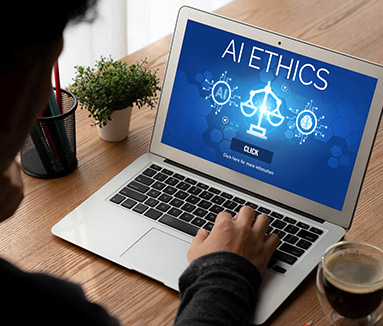AI ETHICS
UF is committed to ensuring that students have the opportunity to wrestle with the important ethical questions surrounding AI and its role in human society.
Ethics at the Forefront
“What should we do?” Ethics is a central question, a central quest of human society. Despite doomsday movies, AI is no different from any other new and evolving technology. Humans learned to forge iron and it changed our world. Iron became steel became steam became mass industrialization. Every shift has raised questions, doubts, fears.
We strive to steep students in the debates and discussions surrounding:
- Protecting privacy
- Removing bias
- Maintaining fairness and learning
- Implementing AI Across the Curriculum
- Answering other questions about AI and AI in education
We teach the broad spectrum of AI so that our students go out into the world literate and capable to work with mass data, algorithms that learn, remote sensing, and generative AI. We expect graduates to be practiced in identifying and grappling with the ethical questions that they will face in their AI-driven workplaces.
Bringing AI Ethics and Policy Under One Umbrella
The Working Group in AI Ethics and Policy includes social scientists, philosophers, legal scholars, and more. We offer AI guidance and promote foundational research across the university.
About Our AI Working GroupAI Ethics for Working Professionals
Required AI Ethics Training
Every student earning a degree or certificate in AI or data science must complete the course Ethics, Data, and Technology.
“Anytime anyone brings up those negative aspects of AI, I tell them those keep me up at night too. Everything around data security and cybersecurity and bias, those are all very real concerns. But it doesn’t mean we stop using AI. It does mean we teach AI ethics to all of our students.” —Dr. David L. Reed, Associate Provost for Strategic Initiatives and Inaugural Director, AI² Center
AI Ethics Across the World
The University of Florida signed the Rome Call for AI Ethics, a global agreement with seven other worldwide university and industrial leaders. By signing, we commit to principles that deliver emerging, ethically-centered technologies.



